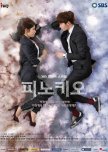Pinnochio was one of the last dramas I had yet to watch of Lee Jong Suk’s. As a fervent stan of his talent (and visuals of course), I am always amazed by the dramas he acts in. My only complaint is that he plays the same role in every one of his dramas and there is a lack of variation in the character he portrays-- the strong-willed, intelligent, and righteous good guy with a strong moral code. Despite this, I always feel like I’m in a comfort zone in every drama he plays. I can be guaranteed that the plot is full of intrigue, romance, mystery, and supernatural--with all these genres combined in a balanced fashion. LJS dramas follow a conventional format to say the least, but I am provided with so much security and enjoyment while watching them. I also love how there always seems to be a deeper message regarding morality and jurisprudence and that there is so much wisdom to be taken in after finishing the drama.
Pinocchio portrays the dark undertones of media coverage through the lens of a reporter. It shows how much politics is involved in media and makes the audience second doubt the legitimacy of the news itself. In particular, it brilliantly shows how obtaining the truth is an impossible and difficult task. The truth-seeking journey provokes so many thoughts and illustrates how there is so much ambiguity in certain circumstances. I found that this message was prevalent in LJS’s “I Hear Your Voice” as well.
In Pinocchio, I like how the conflict was central around characters with familial relations which made it even harder to digress right and wrong of each action because the protagonists get to analyze situations from a bird’s eye view (and also bringing about so much emotional turmoil) instead of being stubborn, mixing up the endeavour for justice even more. The characters undergo huge development and maturation while being faced with the realities of truth and realize how much grey there is in their initial worldview of black and white. Despite the never-ending journey for the truth, the truth is subjective and truth can be twisted to cause harm--this was portrayed through the quirky, supernatural element called “Pinocchio syndrome” which I found creative and effective at reinforcing the joys and dangers of handling the truth.
I enjoyed the conflict that Choi Dal Po had between following the ethics of a reporter or following his own moral code. (Although ethics and moral codes both refer to principles in which one follows, one is external that is socially accepted and one is internal such as personal belief) But what I found well done was that the drama portrayed the human condition in a way that was realistic. No one is inherently evil and everyone has their own means of justification. The way this was gradually portrayed was well paced. Naive and emotionally driven Choi Dal Po juxtaposes the collected and rational Cha Sun Ok. Throughout the story, they gradually reveal the emotional side of Cha Sun Ok as Choi Dal Po learns to approach situations through a more reason-based and objective lens. The reason/emotion conflict between the protagonist and the antagonist reinforced that the path to truth is contingent on both reason and emotion to keep each other in check. The side characters weren’t just side characters: they all had a purpose in portraying the message (save for like two which were there for some added cuteness) and everyone had a backstory that kept up the intrigue or contributed to the emotional and mental development of the protagonists in some way. I feel like I went on such a journey as I reflect on who the characters were in the beginning to the end, and how much happened in between. The plot was action-packed and properly placed in a way that kept tension but revealed enough to satisfy our demands.
As much as I enjoyed the plot, I felt like the most lacking part of the drama was the romance. I suppose for Choi Dal Po to love Choi In Ha would be a step in forgiving and letting go of the grudge he had on her mother. But it felt so unnecessary and insignificant in the midst of the action. In this regard, the romance was just too conventional to be considered unforgettable. It is there because there has to be a romance, but the focus of this drama was more on the message behind new reporting and character development. I couldn’t feel the chemistry between the leads, especially because I was not a particular fan of Park Shin Hye in the first place, and I felt as though LJS, Yoon Gyun Sang, and Jin Kyung were who made it great. Simply, there was no emotional connection for me between the couple, there were no heart-wrenching scenes between them, and it felt like it was more about having a romance in the drama and looking like a couple. The level of romance appealed more to teenagers because of its predictability and lack of tension.
Overall, the main plot is what is worth watching in the show and it definitely got me hooked. For the most part, I disregarded the romance aspect of it, but Pinocchio has everything--some amazing characters, an intellectually stimulating plot and a sprinkle of romance. It’s something that I’m glad I checked out and invested my time in. I recommend this if you’re a first-time LJS watcher, if you’re an old LJS fan, if you like a great plot, and if you want a good watch!
Pinocchio portrays the dark undertones of media coverage through the lens of a reporter. It shows how much politics is involved in media and makes the audience second doubt the legitimacy of the news itself. In particular, it brilliantly shows how obtaining the truth is an impossible and difficult task. The truth-seeking journey provokes so many thoughts and illustrates how there is so much ambiguity in certain circumstances. I found that this message was prevalent in LJS’s “I Hear Your Voice” as well.
In Pinocchio, I like how the conflict was central around characters with familial relations which made it even harder to digress right and wrong of each action because the protagonists get to analyze situations from a bird’s eye view (and also bringing about so much emotional turmoil) instead of being stubborn, mixing up the endeavour for justice even more. The characters undergo huge development and maturation while being faced with the realities of truth and realize how much grey there is in their initial worldview of black and white. Despite the never-ending journey for the truth, the truth is subjective and truth can be twisted to cause harm--this was portrayed through the quirky, supernatural element called “Pinocchio syndrome” which I found creative and effective at reinforcing the joys and dangers of handling the truth.
I enjoyed the conflict that Choi Dal Po had between following the ethics of a reporter or following his own moral code. (Although ethics and moral codes both refer to principles in which one follows, one is external that is socially accepted and one is internal such as personal belief) But what I found well done was that the drama portrayed the human condition in a way that was realistic. No one is inherently evil and everyone has their own means of justification. The way this was gradually portrayed was well paced. Naive and emotionally driven Choi Dal Po juxtaposes the collected and rational Cha Sun Ok. Throughout the story, they gradually reveal the emotional side of Cha Sun Ok as Choi Dal Po learns to approach situations through a more reason-based and objective lens. The reason/emotion conflict between the protagonist and the antagonist reinforced that the path to truth is contingent on both reason and emotion to keep each other in check. The side characters weren’t just side characters: they all had a purpose in portraying the message (save for like two which were there for some added cuteness) and everyone had a backstory that kept up the intrigue or contributed to the emotional and mental development of the protagonists in some way. I feel like I went on such a journey as I reflect on who the characters were in the beginning to the end, and how much happened in between. The plot was action-packed and properly placed in a way that kept tension but revealed enough to satisfy our demands.
As much as I enjoyed the plot, I felt like the most lacking part of the drama was the romance. I suppose for Choi Dal Po to love Choi In Ha would be a step in forgiving and letting go of the grudge he had on her mother. But it felt so unnecessary and insignificant in the midst of the action. In this regard, the romance was just too conventional to be considered unforgettable. It is there because there has to be a romance, but the focus of this drama was more on the message behind new reporting and character development. I couldn’t feel the chemistry between the leads, especially because I was not a particular fan of Park Shin Hye in the first place, and I felt as though LJS, Yoon Gyun Sang, and Jin Kyung were who made it great. Simply, there was no emotional connection for me between the couple, there were no heart-wrenching scenes between them, and it felt like it was more about having a romance in the drama and looking like a couple. The level of romance appealed more to teenagers because of its predictability and lack of tension.
Overall, the main plot is what is worth watching in the show and it definitely got me hooked. For the most part, I disregarded the romance aspect of it, but Pinocchio has everything--some amazing characters, an intellectually stimulating plot and a sprinkle of romance. It’s something that I’m glad I checked out and invested my time in. I recommend this if you’re a first-time LJS watcher, if you’re an old LJS fan, if you like a great plot, and if you want a good watch!
Considerați utilă această recenzie?


























